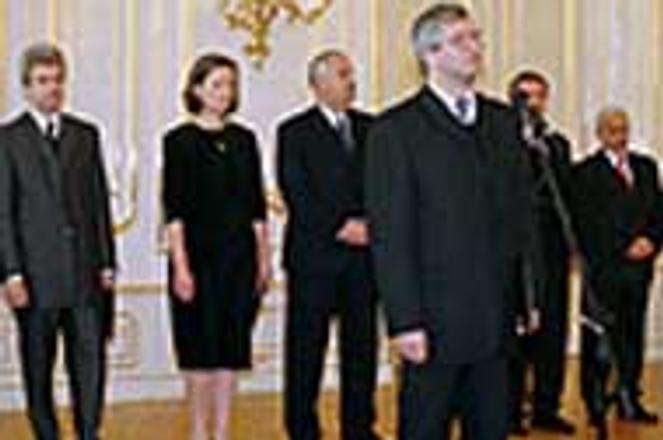Nine new justices are set to take their seats on Slovakia's most illustrious bench; legal analysts are cautiously optimistic.foto: TASR
As nine new Constitutional Court judges prepare to take their seats on January 22, law professionals are cautiously predicting an improvement in the quality if not the independence of Slovakia's highest judicial body.
"From the viewpoint of legal expertise, the new court will be on a high level, and will be an improvement on the outgoing court," said Ernest Valko, who served as chairman of the Czechoslovak Constitutional Court in 1992.
Katarína Zavacka, a legal scientist at the Slovak Academy of Science's Institute of State and Law, said that several of the new justices had served as advisors to the former court, while two others had served on legislative committees in parliament for many years. The combined legal experience of the new justices, she said, as well as their international reputations, made the overall bench "not too bad."
Political connections
Few experts offered unqualified praise for the new crop of Constitutional Court judges. Although only one of the nine new judges was nominated by a political party per se (Lajos Mésáros, proposed by the Hungarian Coalition Party), five of the remaining eight had at least an indirect connection to either the government or the presidency.
Valko, now a high-profile lawyer in Bratislava, said that it was President Rudolf Schuster's exclusive power to select all nine new judges which had given the bench a rather uniform political flavour.
"Overall the judges are left- oriented as to their political beliefs. There are no conservatives on the team," said Valko. "I think President Schuster's choices surprised no one."
Schuster, a former high-ranking communist official, was elected to the presidency in May, 1999, and has made no secret of his enduring left-wing sympathies.
But given the political undertones of many of the nominees, Schuster would have found it difficult to appoint an apolitical court even had he wanted to. The new deputy chief justice, Eduard Barány, was nominated by Peter Weiss, vice-chairman of the socialist Party of the Democratic Left (SDĽ), as was justice Štefan Ogurčák.
The only woman on the new court, justice Ludmila Gajdošíková, was named in turn by Barány in his capacity as head of the State and Law Institute. Juraj Babjak won the support of Pavol Hrušovský, a member of the right-leaning Christian Democrat (KDH) party.
Ján Mazák, the new chief justice of the Constitutional Court, defended the nominations and said that as a general rule, top courts that did not have the support of the government tended to be lame ducks.
"Everywhere in the world, Constitutional Courts which are absolutely apolitical inevitably lack the authority they deserve," said Mazák in an interview with The Slovak Spectator on January 12.
Mazák himself, before being nominated by former Constitutional Court Chief Justice Milan Čič, belonged to the political party founded by President Schuster, the Party of Civic Reconciliation (SOP).
Clear verdicts
Valko also expressed his regret that there was no "quality expert" on constitutional law on the new bench. "These shoes can partly be filled by [newly appointed] Alexander Brostl, but I personally miss [independent MP] Peter Kresák and [outgoing Constitutional Court judge] Ján Drgonec among the nominees," he explained.
Drgonec, for his part, told the weekly opinion paper Domino Fórum that he thought he should have been reappointed, but added the new court was a big improvement on the outgoing one. Under chief justice Milan Čič, Drgonec said, justices had had "certain links" with the ruling HZDS party of Vladimír Mečiar, while Čič himself had "not taken the Constitution as a legal text but a political one."
"Drgonec has a right to criticize the system, but it should be borne in mind that Slovakia is only in the process of building its constitutional judiciary," said new chief justice Mazák.
Of the supposedly 'contradictory' rulings of the Constitutional Court that had been used by the Mečiar government, among other things, to thwart a 1997 referendum on direct presidential elections, Mazák said that "sometimes, unclear or contradictory verdicts are a natural part of such a difficult area of human activity as the courts."
The quality of the court's verdicts has recently been front page news, after a three-judge tribunal led by outgoing justice Tibor Šafárik ruled on December 20 that the government halt its prosecution of a key suspect in a political kidnapping case.
Mazák refused to comment on the Šafarík verdict, saying that "the decision has to be respected because it was rendered in a proper constitutional way."
But Valko said he believed the highly controversial ruling was evidence that the outgoing court had finally caved in to political pressure from the HZDS. "Unfortunately, in its final six months the [outgoing] court lost control of these pressures, especially Šafárik [nominated by the former ruling Slovak Nationalist Party] and Ľudovít Dobrík [a candidate of the HZDS who will continue with the new court until 2004 because he replaced a vacant seat in 1997]. These two judges damaged the reputation and the respectability of the Constitutional Court."
Mazák had no specific antidote against surprise verdicts like the Šafarík decision, but said it was his goal to "secure the unity of the decision-taking process in the Constitutional Court. This means that people who submit a complaint with the Constitutional Court can to a certain extent predict the verdict based on similar verdicts taken by the court in similar cases in the past."


